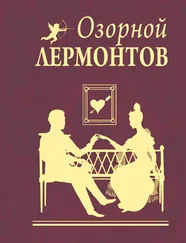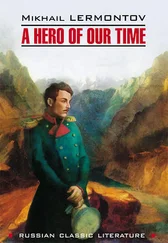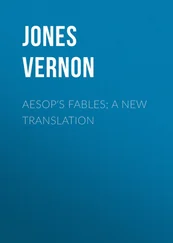My Cossack was very surprised to see me fully dressed when he awoke. I, however, did not give him any reason for it. I admired the blue sky beyond the window, studded with little clouds, above the far coast of the Crimea, which extended in a violet stripe and ended in a cliff, at the top of which a lighthouse tower shone white. Then I set off for the Fanagorya fort in order to learn from the commandant the time of my departure to Gelendzhik.
But alas! The commandant could not tell me anything definitively. The ships standing at the jetty were all patrol or merchant ships, which hadn’t yet started loading. “Maybe in about three, four days, the postal boat will arrive,” said the commandant, “and then we’ll see.” I returned home, morose and angry. I was met in the doorway by the frightened face of my Cossack.
“It’s bad, Your Honor!” he said to me.
“Yes, brother, God knows when we’ll get out of this place!”
He seemed even more alarmed at this and, leaning into me, said in a whisper:
“It is unclean here! Today I met a Black Sea uryadnik. [5] uryadnik: A Cossack NCO, a noncommissioned officer.
I know him—he was in my detachment last year. And when I told him where we were staying, he said: ‘Brother, it’s unclean there, the people are not good!’ Yes, and it’s true, who is this blind boy? He goes everywhere alone, to the bazaar, to get bread, to fetch water… it’s clear that they’re used to him around here.”
“What of it? Has the proprietress appeared at least?”
“Today, when you were gone, an old woman came and with her a daughter.”
“What daughter? She doesn’t have a daughter.”
“God knows who she was, if she wasn’t the daughter. Over there, the old woman is sitting in her house.”
I went into the peasant house. The stove had been lit and it was hot; a meal, a rather luxurious one for the likes of poor folk, was cooking inside it. The old woman answered all my questions with the reply that she was deaf and couldn’t hear. What was I to do with her? I addressed myself to the blind boy who was sitting in front of the stove and putting brushwood in the fire.
“So, tell me, you blind imp,” I said, taking him by the ear,
“where did you trundle along to with your bundle last night?” Suddenly, my blind boy started to cry, scream, and moan.
“Where’d I go? Went nowhere… with a bundle? Which bundle?”
This time the old woman heard, and started to growl: “Listen how they make things up—and about a cripple too! What do you want of him? What has he done to you?”
I was fed up with this and left, solidly resolved to find the key to this mystery.
I wrapped myself up in my felt cloak and sat by the fence on a rock, looking into the distance. The sea extended before me, still agitated from last night’s storm. And its monotonous sound, similar to the murmur of a city falling asleep, reminded me of years past, and carried my thoughts northward to our cold capital city. Disturbed by these reminiscences, I sank into reverie… About an hour passed thus, or perhaps more… Suddenly, something that sounded like a song struck my ear. Yes, indeed, it was a song, in a fresh, little female voice—but where was it coming from?… I listen—the song is strange, sometimes drawn-out and sad, at other times quick and lively. I look around—there is no one anywhere. I listen again. It was as though the sounds were falling from the sky. I looked up: a girl with unruly braids wearing a striped dress was standing on the roof of the peasant house—a veritable rusalka. [6] rusalka: A water nymph, frequently demonic, who lives underwater, often at the bottom of rivers.
Protecting her eyes from the sun’s rays with her palm, she was peering intently into the distance, either laughing or saying something to herself or singing her song again.
I remember the song, every word of it:
The ships pass,
Their white sails,
Over the green sea
As though by charter free.
My little boat
With two oars,
And no sails, slips
Among those ships.
If a storm strikes up
The old ships
Will raise their wing
Over the sea spreading.
I bow to the sea now
Low very low,
“Menace not this night,
oh sea of spite:
my little boat
with its riches floats
through the dark, blind
with a wild little mind.”
I was unwillingly subject to the thought that I had heard that same voice during the night. I was distracted for a minute, and when I looked up again at the roof, the girl wasn’t there. Suddenly she ran past me, singing something different; and, snapping her fingers, she ran inside to the old woman and they began an argument. The old woman was getting angry and the girl guffawed. And then I saw my water sprite come running back again, skipping along. When she had come up beside me, she stopped and looked me intently in the eye, as if she was astonished by my presence. Then she went off to the jetty, casually and quietly. But that wasn’t the end of the story. She circled my lodgings the whole day. And the singing and skipping didn’t cease. Strange being! There were no signs of lunacy in her face. On the contrary, her eyes settled on me with a spry perspicacity, and those eyes, it seemed, were endowed with some sort of magnetic power; it was as if they were awaiting a question each time they looked at you. But as soon as I started to speak she ran off, smiling craftily.
I have definitely never seen a girl like her. She was far from being a beauty, but then I have prejudices with regard to beauty too. There was a look of breeding to her… breeding in women, as in horses, is of great matter. This discovery belongs to La Jeune-France. [7] La Jeune-France: A group of young French writers of the 1830s who are known to have exaggerated the theories of Romanticism. They looked up to Victor Hugo.
It, beauty that is, not La Jeune-France, is in large part manifested in the gait, in the arms and the legs. The nose is especially telling. A straight nose is rarer in Russia than small feet. My songstress seemed no more than eighteen years old. Her figure had an unusual suppleness to it, she had a particular inclination of the head; she had long light-brown hair, a sort of golden tint to the slightly sun-tanned skin on her neck and her shoulders, and an especially straight nose. All this enchanted me. I read something wild and suspicious in her oblique gaze, and there was something indeterminate in her smile but such is the strength of prejudice: her straight nose had carried me from my senses. I imagined that I had found Goethe’s Mignon, [8] Mignon: A character in Goethe’s novel Wilhelm Meisters Lehrjahre.
the marvelous creation of his German imagination. Certainly there were many similarities: the same quick transitions between extreme agitation and complete motionlessness, the same mysterious utterances, the same leaping about, and strange songs…
Toward evening, I stopped her at the door and conducted the following conversation with her:
“Tell me, pretty girl,” I asked, “what were you doing today on the roof?”
“Uh, I was looking to see whence comes the wind.”
“What for?”
“Whence the wind, hence happiness also.”
“What? Were you summoning happiness with your song?”
“Where there is song, there is happiness.”
“And suppose you sing sorrow to yourself?”
“What of it? Where things aren’t better, they are worse, and from worst to best is not far.”
“Who was it that taught you this song?”
“No one taught it to me. As it occurs to me, so I sing. Whoever hears it, hears it. And he who should not hear it, won’t understand it.”
Читать дальше
Конец ознакомительного отрывка
Купить книгу
![Михаил Лермонтов A Hero of Our Time [New Translation] обложка книги](/books/27671/mihail-lermontov-a-hero-of-our-time-new-translati-cover.webp)










